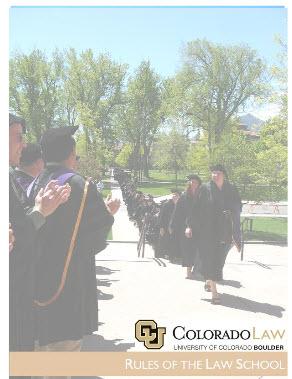Graduating in 2.5 Years
Colorado Law allows students to graduate in five semesters (e.g., in December rather than in May) so long as all graduation requirements have been met. Graduating in 2.5 years gives our students the opportunity to enter (or re-enter) the workforce quicker and possibly save them some tuition money along the way. All it takes is some planning to make sure you are on track to meet all the credit (and degree) requirements. In a nutshell, graduation requires the completion of 89 credits consistent with any applicable caps, including all required first-year courses, evidence, legal ethics, and a seminar course numbered 8000 or higher.
After you read the information below, we encourage you to think carefully about whether graduating in 2.5 years is right for you. Keep in mind that you can still complete 89 credits in five semesters, but you do not have to graduate in December. For example, you could do a full-time paid internship during either fall or spring of your third year in order to gain more work experience prior to graduating.
How Graduating in 2.5 Years Works
Typically, students take 31 credits during their first year (16 in the fall and 15 in the spring) and about 15 credits per semester during their second and third years. In order to graduate within 2.5 years, a student must earn their credits at an accelerated rate. Here are some options for earning your degree faster:
- Take up to 18 credits per semester. Taking heavier loads during your second and third years leaves the summers free for work, externships, and other enriching activities.
- Take intersession courses. Intersession courses are a great way to earn additional credits without paying more tuition.
- Take summer courses here at Colorado Law or by studying abroad or in another law school’s summer courses. We encourage students to think carefully, however, before pursuing these options. Summer programs not only require additional tuition but some (especially those involving study abroad) involve additional expenses. Moreover, summer courses may require you to forego critical work experience, when the available evidence suggests that students with more work experience during law school secure post-graduate employment more quickly than those without such experience.
Pros and Cons of Graduating in 2.5 Years
| Pros | Cons | Variables |
|
|
|
Below are a few examples of schedules that enable you to graduate in 2.5 years. Remember, these are samples only; they are intended to give you a better sense of what your law school schedule may look like. Other variations are also possible. The most important thing is that you complete the required 89 credit hours.
| Sample Schedule A: Without Summer Classes | Sample Schedule B: Without Summer Classes & With Intersession Classes All Three Years | Sample Schedule C: With Summer & Intersession Classes & No 1L Elective |
| 1st Semester (1L Fall): 16 credits 2nd Semester (1L Spring): 15 credits Fallsession: 1 credit 3rd Semester (2L Fall): 18* credits Wintersession: 2 credits 4th Semester (2L Spring): 18 credits Second summer off for work experience Fallsession: 1 credit 5th Semester (3L Fall): 18 credits _______________________________ By December graduation (2.5 years): 89 credits | 1st Semester (1L Fall): 16 credits 2nd Semester (1L Spring): 15 credits First summer off for work experience Fallsession: 1 credit 3rd Semester (2L Fall): 18 credits Wintersession: 2 credits 4th Semester (2L Spring): 18 credits Second summer off for work experience Fallsession: 1 credit 5th Semester (3L Fall): 18 credits _______________________________ By December graduation (2.5 years): 89 credits | 1st Semester (1L Fall): 16 credits 2nd Semester (1L Spring): 15 credits Summer Term: 7-8 credits** 3rd Semester (2L Fall): 16 credits Wintersession: 1-2 credits 4th Semester (2L Spring): 18 credits Second summer off for work experience 5th Semester (3L Fall): 16 credits _______________________________ By December graduation (2.5 years): 89 credits |
*Please note that students may not take more than 18 credits per semester per ABA rules.
**Note that summer tuition tends to be higher per credit hour. Get more information about tuition and fees.
Taking Intersession Courses and Electives During 1L Year
First-year students can sometimes take up to one elective during the spring semester. If you are interested in graduating in 2.5 years, it is best to start planning during your 1L year. If you have not already done so, we ask that you email lawreg@colorado.edu to let the registrar’s office know that you are planning to graduate in 2.5 years. It is your responsibility to ensure that you meet all graduation requirements.
Questions? Read the frequently asked questions about the 2.5 year program.



